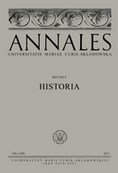Obcość w relacjach międzycywilizacyjnych na przykładzie opisu wschodniej tyranii w „Poselstwie” Eliasza Pielgrzymowskiego
The Strangeness in Inter-civilization Relations Based on the Example of a Description of Eastern Tyrants in Eliasz Pielgrzymowski’s “The Legation”
Author(s): Arkadiusz M. StasiakSubject(s): Cultural history, Political history, Social history, Government/Political systems, Politics and society, 17th Century
Published by: Wydawnictwo Naukowe Uniwersytetu Marii Curie-Sklodowskiej
Keywords: Eliasz Pielgrzymowski; tyrant; freedom; Moscow culture; European culture;
Summary/Abstract: In 1600, Eliasz Pielgrzymowski was the secretary of the Polish mission to Moscow. He stayed in the capital of the Grand Duchy of Moscow until the end of the negotiations, i.e. until March 11, 1601. After returning to Poland, he prepared a retrospective The Legation – the main source of the analysis contained in this article. One of the basic motives of The Legation is fear of the Moscow tyrant and his people. The author of the work exposed the tyranny of the prince leading to the slavery of subjects, so different from the freedom of the Polish nobility. He often demonstrates the inferiority of Moscow culture to European culture.
Journal: Annales Universitatis Mariae Curie-Skłodowska, sectio F – Historia
- Issue Year: 75/2020
- Issue No: 1
- Page Range: 85-95
- Page Count: 11
- Language: Polish

